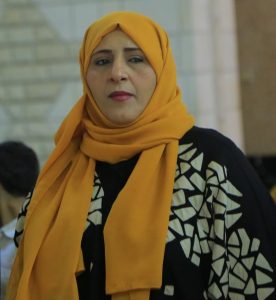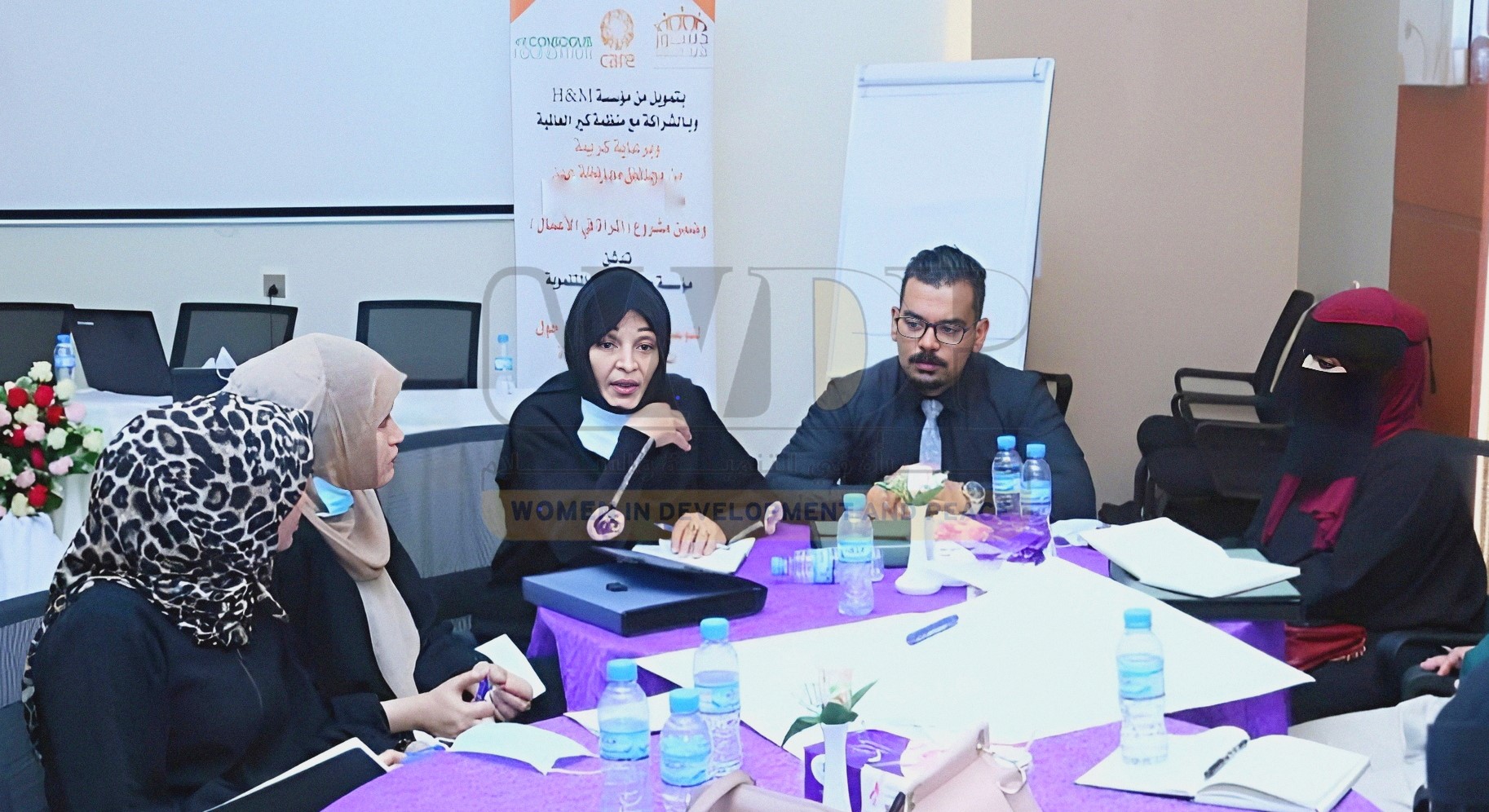Women in Development and Peace – Hanan Hussein
The ongoing conflict in Yemen has cast a dark shadow over all aspects of life in Yemeni society, including the business sector. Women entrepreneurs face exceptional challenges that hinder their work and threaten the sustainability of their projects. Despite these difficulties, Yemeni businesswomen demonstrate remarkable resilience and determination, continuing to work diligently to ensure the viability of their projects in the real world.
Yemeni businesswomen play a pivotal role in the journey of peacebuilding and decision-making. Their unique abilities contribute to stimulating economic development, creating new employment opportunities, integrating marginalized groups, and promoting comprehensive dialogue and community participation.
Contributions of Women in Business

Manal Al-Thawr, a Board Member of Businesswomen, who works in women’s business management, states: “Yemeni women have emerged in various spheres of life, whether in politics, economics, or social contexts. They embody resilience and perseverance, proving their effectiveness across different fields, including the economic domain. Through various national economic programs and projects, they play a crucial role in alleviating poverty, reducing unemployment, and advancing national development.”
 Zafaran Al-Muhanna, head of the Women’s Skills Department, emphasizes: “Yemeni women entrepreneurs have played a vital role in sustainable development within the country. Despite the challenging circumstances Yemen has faced, their positive impact extends nationally, both economically and socially. They have provided a unique model, contributing at least within their communities by reducing poverty and offering diverse employment opportunities, often in collaboration with family members and neighbors.”
Zafaran Al-Muhanna, head of the Women’s Skills Department, emphasizes: “Yemeni women entrepreneurs have played a vital role in sustainable development within the country. Despite the challenging circumstances Yemen has faced, their positive impact extends nationally, both economically and socially. They have provided a unique model, contributing at least within their communities by reducing poverty and offering diverse employment opportunities, often in collaboration with family members and neighbors.”
Zafaran further adds: “Yemeni women have contributed innovative ideas and skills, demonstrating their ability to drive progress and effect change even in the most challenging conditions. Their diverse entrepreneurial projects range from home-based initiatives to small, medium, and large-scale ventures.
Women Entrepreneurs and Peacebuilding
The presence of women in entrepreneurship and decision-making is of paramount importance. They tirelessly contribute to driving economic development and serving their communities and nations. Manal Al-Thawr emphasizes that women entrepreneurs play a crucial role in achieving peace. Their broader vision, through national programs and projects, contributes to peacebuilding and decision-making processes.
Yemeni businesswomen have demonstrated their strength and competence in finding solutions to various challenges facing Yemen, particularly economic ones. They propose ideas and projects that improve the well-being of Yemeni families and enhance their livelihoods.
Zafaran Al-Muhanna highlights that women’s role is essential across various aspects, especially in comprehensive peacebuilding. Their presence, including women entrepreneurs, is as crucial as that of men. Both genders are interconnected pillars during the “challenge for security and stability” phase. Given that women constitute 50% or more of Yemen’s population, excluding them would perpetuate gaps even after addressing all the problems Yemen has faced.
As she says: ‘The mechanism of integrating women in the challenge phase and supporting security and stability in Yemen is an important step to enhance their participation in peacebuilding at all levels. It is a unique opportunity to reinforce Yemen’s commitment to addressing the issue of limited women’s participation in the peace process.’”
A Prominent Role
Zafaran Al-Muhanna believes that the role of women is essential and significant in various aspects, especially during the comprehensive peacebuilding phase. The presence of women, particularly businesswomen, in this context, is of utmost importance. Their presence is as crucial as that of men, as both are interconnected pivotal elements during the “challenge to support security and stability” phase. Zafaran emphasizes that Yemeni women constitute half of society and serve as educators and mentors for the other half. Therefore, taking their voices into account is essential
Challenges and Obstacles
Women entrepreneurs in Yemen face several challenges that hinder their peacebuilding efforts. These challenges include insecurity, which restricts their freedom of movement and ability to develop and practice business initiatives. Additionally, resource scarcity and deteriorating basic infrastructure further complicate their economic and political contributions. Discriminatory treatment by some clients and suppliers also affects their decision-making participation at local and international levels.
Manal Al-Thawr emphasizes that excluding women from economic negotiations related to comprehensive peacebuilding and overlooking their crucial role in recovery and reconstruction is a grave mistake. Such oversight negatively impacts peace processes and recovery efforts.
Treatments and Solutions
In the context you provided, there are several recommendations and treatments that empower women in business to progress effectively in entrepreneurship and contribute to peacebuilding. Manal mentioned a set of proposals from her perspective, saying:” “There are several recommendations from my perspective; they involve highlighting programs and proposals offered by women entrepreneurs related to the stages of peacebuilding, recovery, and reconstruction. Economically, it is essential to involve them in peace negotiations and economic decision-making. Additionally, adopting projects aligned with achieving comprehensive sustainable development goals is crucial.
Zafaran speaks about proposed treatments from her perspective. She says: ‘We need brainstorming workshops and consultative meetings to generate recommendations from within women’s communities that have embraced the challenge and entered the world of entrepreneurship through small or medium-sized projects. To become more precise, we must work on developing a clear and specific vision, understanding the challenges—whether legislative, societal, or media-related—and finding solutions.’
Zafaran also adds that specialized training courses on peacebuilding plans and programs should be implemented specifically for women entrepreneurs. Additionally, providing investment opportunities and financial support, among other forms of assistance, is essential for women business leaders in Yemen.”
Women-led projects in Yemen continue to experience continuous and noticeable development, even amidst societal difficulties and ongoing conflicts in the country. Women remain capable of facing challenges, overcoming obstacles, and starting from scratch. Their ideas constantly renew, and their boundless creativity has the potential for a positive impact if targeted in the comprehensive peacebuilding process. Will we see more peaceful and sustainable societies soon? And will the number of women participating in projects that contribute to peacebuilding and decision-making increase?”

